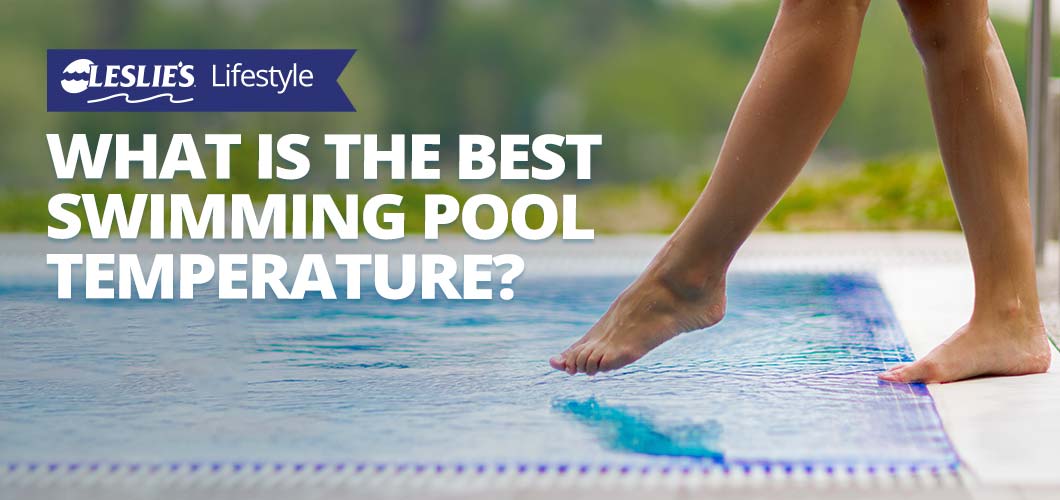
What is the Best Swimming Pool Temperature?
There is nothing better than taking a dip in your beautiful swimming pool on a summer day. But what if your pool water is warmer than your bathwater? Or what if it's colder than the Arctic ocean? Talk about a buzzkill! Owning a pool means understanding the aspects of pool upkeep, especially the conditions for an ideal swim. An uncomfortable swimming pool temperature is guaranteed to put a damper on your swimming experience. But what is the best swimming pool temperature?
Whether you're a new pool owner, or you've had a pool for many years, understanding the significance of swimming pool temperature is more important than you think. Keep reading to find out why.
What Temperature Should My Swimming Pool Be?
So, what is the perfect swimming pool temperature? That's a great question! If you search the internet for an answer, you will find many different answers. In our opinion — and in the American Red Cross's opinion — the ideal swimming pool temperature for most scenarios is somewhere between 78°F and 85°F. However, this temperature range is only a middle ground. Depending on who is using your pool, and for what purpose, your swimming pool temperature may need to be adjusted. Not sure what your swimming pool temperature is? Grab a floating thermometer to easily keep tabs on the temp.
Why is Swimming Pool Temperature Important?
Everyone has their own opinion on the perfect swimming pool temperature. Unfortunately, it's not a "one size fits all" kind of thing. There are a few important factors to note when determining the ideal swimming pool temperature. For example, do you use your pool for leisure, or do you use it for exercise activities? Do you have young children or elderly adults enjoying a swim? The temperature of your pool may need to be adjusted to accommodate the needs of who uses it. Furthermore, where you live plays a part in determining the ideal swimming pool temperature. Air temperature and humidity levels also play a major role in what water temps feel most comfortable.
Different Pool Temperatures for Different Scenarios
The appropriate swimming pool temperature is not just about personal preference — it's about safety and comfort. Many people use pools for more than simply entertainment. Swimming pools are used for exercise, physical therapy, and safety classes. Therefore, being able to tailor a swimming pool’s temperature to fit the swimmer is necessary. When choosing an ideal temperature, you'll want to consider:

The age of the swimmers using your pool.

The level of exercise or activity involved.

Pool purpose or physical therapy needs.
Age of Swimmers
When it comes to the age of swimmers, remember this: the younger the swimmer, the warmer the water should be. Because of their size, children tend to retain much less heat than adults. If a child jumps into a pool that's too cold, they risk having breathing difficulties, and can even go into shock. The suggested pool temperature for children is 84°F or higher. This temperature not only keeps children warm, it also keeps them calm and comfortable.
Older individuals, seniors in particular, also do not tolerate extreme temperatures well. Pools that are too cold or too hot can cause discomfort. For older adults, the ideal temperature in a pool generally ranges from 83°F to 86°F.
Hypothermia is a very real concern when it comes to young children or elderly adults in the pool. While they are on the opposite ends of the age spectrum, their body functions are quite similar with heat retention. This means both the young and the elderly often have trouble regulating their own body temperatures. If a pool is too cold for either group, they can quickly develop signs of hypothermia, such as blue lips, shivering, and clammy skin. Likewise, if the water gets too warm, extended periods in the water paired with high levels of activity can lead to hyperthermia, which is when the body overheats. More on that next!
POOL HEATING TIP: Wanting to warm up the pool? There are endless options available to meet any budget. From cost-effective solar covers and eco-friendly solar heaters to pool equipment like gas heaters and heat pumps, there are many different ways to add a few degrees to your pool water. For more information, check out our blog posts on Pool Heaters vs. Heat Pumps or our Solar Cover Buyer's Guide.
Exercise
Believe it or not, it is possible to overheat while doing an intense swim workout. Yes, even in an indoor pool! Your body can't adequately release heat through your skin if the pool water is too warm. Overheating while swimming can cause muscle cramps and spasms. If you can’t use your muscles correctly, you can’t swim correctly, which can put you at risk in the water. Therefore, before you start your swim workout, make sure the swimming pool temperature is below 80°F. It might seem a bit chilly at first, but you will warm up and adjust quickly. Especially if you do a few laps of the dreaded butterfly stroke!
Physical Therapy
Hydrotherapy, also called aquatic therapy or water therapy, is a form of physical therapy that uses — you guessed it — water. Hydrotherapy is an incredibly effective way to recover from injuries, soothe arthritis or fibromyalgia pain, and exercise with little to no impact on joints. Unlike the cooler pool water athletes prefer, hydrotherapy pools — which are meant to soothe and relax — should be around 90°F to 95°F for low activity levels. For a light to moderate amount of exercise and movement, temperatures between 83ºF and 88ºF may be more appropriate to prevent swimmers from overheating.
Benefits of Controlled Pool Temperatures
Now that you understand the importance of swimming pool temperature, how do you manage it? Before you start heating and cooling your pool left and right, consider how that will affect not only your wallet, but also your pool water chemistry. Constantly adjusting your pool's temperature can wreak havoc on your pool heater and your energy bill. Maintaining a consistent temperature range range of 78°F to 85°F will keep your pool clean, comfortable, and affordable. With controlled, consistent pool temperatures, you'll have an easier time with:

Controlling algae and bacteria in your pool water.

Maintaining pool water balance at steady, predictable levels.

Keeping swimmers safe and comfortable in the water.
Algae and Bacteria Control
Algae and bacteria love a warm pool as much as we love snuggling on the couch under a toasty blanket. The warmer your pool water is, the more likely pesky contaminants will take up residence. If you keep your swimming pool temperature below 85°F, the potential for algae and bacteria growth decreases. But if you prefer your pool to stay on the warmer side, you will likely have to shock the water more frequently. Shocking your pool will eliminate and prevent the growth of algae and bacteria.
Water Balance
Frequently adjusting your swimming pool temperature forces pool chemicals, such as chlorine, to work in overdrive. Which in turn, causes them to deplete faster than normal. However, this generally only happens when you raise your pool temperature above 85°F. Keeping your pool at a regular, cooler temp is beneficial, because it lets the chemicals function in ideal conditions. If you suspect your pool chemistry is out of balance, grab an at-home water testing kit, or bring a water sample into your local Leslie's for a free in-store AccuBlue® water analysis.
POOL COOLING TIP: How do you cool down a swimming pool? Other than chillers and pool cooling pumps, which are essentially a heat pump in reverse, many ways to cool down a swimming pool involve a bit of creative pool maintenance, using evaporative cooling and lower nighttime temperatures to your advantage. We cover many of those methods in our blog post, How to Cool Your Pool in the Summer.
Swimmer Comfort and Safety
Ultimately, maintaining a steady swimming pool temperature is most important for your swimmers. Before you set your pool temperature, consider who will be swimming in your pool during the season. If young children or older adults use it most frequently, set the temperature to the higher end of the recommended range. Just remember to keep an eye out for algae and bacteria growth. If you plan to use your pool for intense exercise, we suggest keeping it on the cooler side. While you may have to occasionally adjust the temperature on the fly, being prepared is key to staying consistent.
From maintaining water chemistry balance to routine equipment upkeep, pool ownership comes with a long list of responsibilities. Don't let a freezing float or a sweltering soak ruin the best part of owning a pool — swimming! Managing your swimming pool's temperature is key to enjoying your pool to the fullest, and providing a great experience for guests. If you have any questions about swimming pool temperatures or need professional advice on heating and cooling options for your pool, the friendly in-store team at your local Leslie's is always here to help.